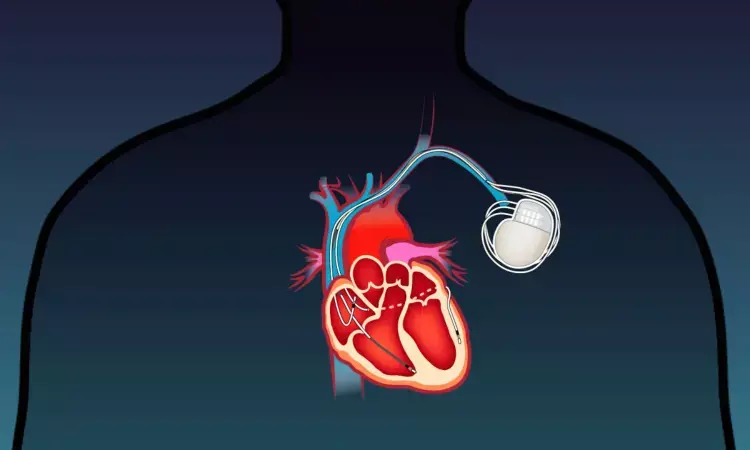- Home
- Medical news & Guidelines
- Anesthesiology
- Cardiology and CTVS
- Critical Care
- Dentistry
- Dermatology
- Diabetes and Endocrinology
- ENT
- Gastroenterology
- Medicine
- Nephrology
- Neurology
- Obstretics-Gynaecology
- Oncology
- Ophthalmology
- Orthopaedics
- Pediatrics-Neonatology
- Psychiatry
- Pulmonology
- Radiology
- Surgery
- Urology
- Laboratory Medicine
- Diet
- Nursing
- Paramedical
- Physiotherapy
- Health news
- Fact Check
- Bone Health Fact Check
- Brain Health Fact Check
- Cancer Related Fact Check
- Child Care Fact Check
- Dental and oral health fact check
- Diabetes and metabolic health fact check
- Diet and Nutrition Fact Check
- Eye and ENT Care Fact Check
- Fitness fact check
- Gut health fact check
- Heart health fact check
- Kidney health fact check
- Medical education fact check
- Men's health fact check
- Respiratory fact check
- Skin and hair care fact check
- Vaccine and Immunization fact check
- Women's health fact check
- AYUSH
- State News
- Andaman and Nicobar Islands
- Andhra Pradesh
- Arunachal Pradesh
- Assam
- Bihar
- Chandigarh
- Chattisgarh
- Dadra and Nagar Haveli
- Daman and Diu
- Delhi
- Goa
- Gujarat
- Haryana
- Himachal Pradesh
- Jammu & Kashmir
- Jharkhand
- Karnataka
- Kerala
- Ladakh
- Lakshadweep
- Madhya Pradesh
- Maharashtra
- Manipur
- Meghalaya
- Mizoram
- Nagaland
- Odisha
- Puducherry
- Punjab
- Rajasthan
- Sikkim
- Tamil Nadu
- Telangana
- Tripura
- Uttar Pradesh
- Uttrakhand
- West Bengal
- Medical Education
- Industry
CRT Defibrillator bests IC Defibrillator for increasing survival in HF patients with wide QRS complex: NEJM

USA: Long-term results of the RAFT trial showed survival benefits associated with receipt of cardiac resynchronization therapy defibrillator (CRT-D) as compared with implantable cardioverter-defibrillator (ICD) in eligible heart failure patients (HF) with a wide QRS complex.
"Survivors with nearly 14 years of follow-up continued to tilt the study's all-cause mortality rates in favour of CRT-D (71.2% versus 76.4% with ICD)," the researchers reported in the New England Journal of Medicine. "Time until death was significantly different between the two randomly assigned therapies (acceleration factor 0.80)."
A secondary outcome, the composite of death from any cause, implantation of a ventricular assist device, or heart transplantation was also less likely with a CRT-D compared with ICD therapy (75.4% vs 77.7%, acceleration factor 0.85).
A CRT-D (or biventricular pacemaker) has electrodes going to both the right and left ventricles so that a pulse generator can signal them to pump with correct synchrony.
The RAFT (resynchronisation–defibrillation for Ambulatory Heart Failure Trial) showed a greater benefit concerning mortality at 5 years among patients who received CRT than among those who received ICDs. However, there is no clarity on the effect of CRT on long-term survival.
John L Sapp, Dalhousie University in Halifax, Nova Scotia, and colleagues included patients with New York Heart Association (NYHA) class II or III heart failure, a left ventricular ejection fraction of 30% or less, and an intrinsic QRS duration of 120 msec or more (or a paced QRS duration of 200 msec or more). They were randomly assigned to receive either an ICD alone or a CRT defibrillator.
They assessed long-term outcomes among patients at the eight highest-enrolling participating sites. The study's primary outcome was death from any cause; the secondary outcome was a composite of death from any cause, implantation of a ventricular assist device, or heart transplantation.
The trial enrolled 1798 patients, of whom 1050 were in the long-term survival trial; the median duration of follow-up for the 1050 patients was 7.7 years, and the median duration of follow-up for those who survived was 13.9 years.
Key findings of the study:
- Death occurred in 76.4% assigned to the ICD group and in 71.2% assigned to the CRT-D group.
- The time until death appeared to be longer for those assigned to receive a CRT-D than those assigned to receive an ICD (acceleration factor, 0.80).
- A secondary outcome event occurred in 77.7% of patients in the ICD group and 75.4% in the CRT-D group.
The limitations included a lack of accounting for crossovers between groups and the low representation of women and different races.
"Because CRT offers remarkable improvements in quality of life, functional capacity, and survival, the principles of providing earlier treatment for HF might now include CRT, particularly with improvement in technology," Lynne Warner Stevenson and Jay Montgomery both of Vanderbilt University Medical Center in Nashville, wrote in an accompanying editorial.
The study authors cautioned that since the completion of the initial trial, there has been an advancement in pharmacologic therapy for heart failure, with the introduction of neprilysin inhibitors and SGLT2 inhibitors. CRT improves cardiac performance without increasing cardiac work and would be anticipated to have a complementary effect to pharmacotherapy; however, the impact of CRT on survival for patients treated with newer drugs is uncertain.
Reference:
Sapp JL, Sivakumaran S, Redpath CJ, Khan H, Parkash R, Exner DV, Healey JS, Thibault B, Sterns LD, Lam NHN, Manlucu J, Mokhtar A, Sumner G, McKinlay S, Kimber S, Mondesert B, Talajic M, Rouleau J, McCarron CE, Wells G, Tang ASL; RAFT Long-Term Study Team. Long-Term Outcomes of Resynchronization-Defibrillation for Heart Failure. N Engl J Med. 2024 Jan 18;390(3):212-220. doi: 10.1056/NEJMoa2304542. PMID: 38231622.
Dr Kamal Kant Kohli-MBBS, DTCD- a chest specialist with more than 30 years of practice and a flair for writing clinical articles, Dr Kamal Kant Kohli joined Medical Dialogues as a Chief Editor of Medical News. Besides writing articles, as an editor, he proofreads and verifies all the medical content published on Medical Dialogues including those coming from journals, studies,medical conferences,guidelines etc. Email: drkohli@medicaldialogues.in. Contact no. 011-43720751


